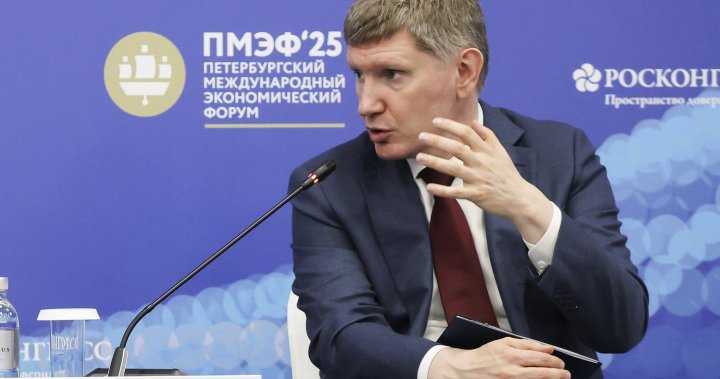Russia’s economy is on the verge of sliding into recession and monetary policy decisions will now determine whether it falls into one or not, Economy Minister Maxim Reshetnikov warned on Thursday.
Reshetnikov delivered the downbeat message at Russia’s annual showcase economic forum in the northern Russian city of St Petersburg, an event sometimes called “the Russian Davos” which is meant to promote investment in the Russian economy.
He urged the central bank to support the economy when it comes to monetary policy as the Kremlin said that the current key interest rate – of 20% – was putting a break on the economy even though that was a conscious decision.
Russia this month cut interest rates for the first time since 2022, but borrowing costs remain close to record levels and for months businesses have complained of high rates stifling investment.
The central bank has kept rates high to curb inflation in the overheated economy, which is focused on the needs of the military fighting in Ukraine.
“According to the figures, there is cooling, but all our figures are in the rear-view mirror,” Reshetnikov said on a panel at the St Petersburg International Economic Forum.
“According to the current feelings of businesses and business indicators, we are already, it seems to me, on the verge of going into recession. On the verge.”
Reshetnikov clarified that a recession was not inevitable though and later told journalists that avoiding one would depend on policy decisions, above all on interest rates.
“I didn’t predict a recession. I said we’re on the brink. From here on out, everything will depend on our decisions,” he said.

In addition to keeping faith in Russia’s 4% inflation target, Reshetnikov said he was in favor of “giving the economy some love,” addressing Central Bank Governor Elvira Nabiullina, who was on the same panel.
President Vladimir Putin in March urged his economic officials not to freeze the Russian economy as if it were in a “cryotherapy chamber” with high borrowing costs and Reshetnikov has previously warned of “hypothermia” risks.

Get breaking National news
For news impacting Canada and around the world, sign up for breaking news alerts delivered directly to you when they happen.
For now, the outlook does not look promising.
The Centre for Macroeconomic Analysis and Short-Term Forecasting, an economic think tank close to the government, said this week that most civilian sectors are in recession and there is no sign of what can kick-start economic growth.
“It seems that an ‘an economy of stagnation’ has formed,” the think tank analysts’ wrote.
At Thursday’s session, central bank governor Nabiullina, said the current slowdown in GDP growth was “a way out of overheating.” Finance Minister Anton Siluanov said there was cooling in Russia, but that “summer always follows a cold snap.”
Alexander Vedyakhin, First Deputy CEO of Russia’s largest lender Sberbank, said in an interview with Reuters this week that tight monetary policy was creating over-cooling risks and said much lower interest rates of 12-14% were needed to restart investment lending.

The economy, hit with a slew of sanctions after the Kremlin sent troops into Ukraine in February 2022, has so far outperformed predictions. High defense spending has propelled growth and kept unemployment low despite fueling inflation. At the same time, wages have gone up to keep pace with inflation, leaving many workers better off.
Large recruiting bonuses for military enlistees and death benefits for those killed in Ukraine also have put more income into the country’s poorer regions. But over the long term, inflation and a lack of foreign investments remain threats to the economy, leaving a question mark over how long the militarized economy can keep going.
Economists have warned of mounting pressure on the economy and the likelihood it would stagnate due to lack of investment in sectors other than the military.
(Reporting by Reuters in St Petersburg, Darya Korsunskaya in London and Elena Fabrichnaya in Moscow; Writing by Alexander Marrow; Editing by Andrew Osborn and Toby Chopra)
—Additional files from the Associated Press
© 2025 The Canadian Press



